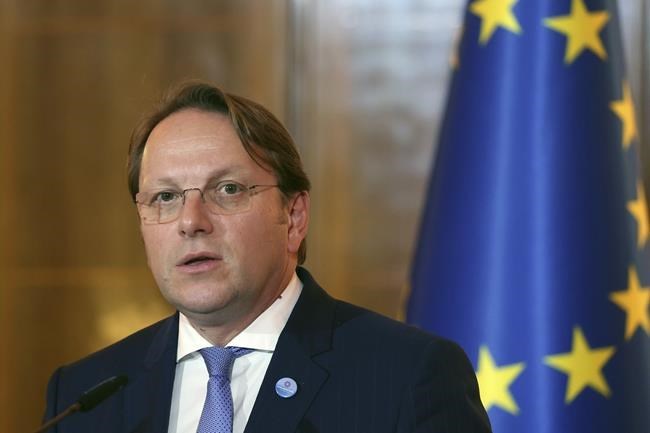BRUSSELS (AP) — The European Union late Monday reversed an earlier announcement by an EU commissioner that the bloc was “immediately” suspending development aid for Palestinian authorities and instead said it would urgently review such assistance in the wake of the attacks on Israel by Hamas to make sure no money was misused.
“There will be no suspension of payments” at the moment, a terse European Commission statement said late Monday, five hours after EU Commissioner Oliver Varhelyi had said that all payments from the development program for Palestinians would be “immediately suspended. All projects put under review. All new budget proposals … postponed until further notice.”
No immediate explanation for the reversal was given. A full European Commission statement always trumps a statement from an EU commissioner, but the reversal on a 691 million-euro ($730 million) program capped an embarrassing day at the EU’s executive at a time of extreme geopolitical sensitivities.
Since Saturday, support of the 27-nation bloc for Israel had been steadfast, including that the country had now every right within international law to defend itself in the war with Hamas.
The surprise announcement by Varhelyi on development aid came just hours after EU officials stressed that no EU money whatsoever was going to Hamas in the first place and that contacts had been frozen for 16 years. The EU considers Hamas a terror group.
After hours of uncertainty over how deep the measures would reach and whether they would possibly also affect aid to those in immediate need, the European Commission said there was no suspension for now, but said it started “an urgent review of the EU's assistance for Palestine.”
“The objective of this review is to ensure that no EU funding indirectly enables any terrorist organization to carry out attacks against Israel,” the statement said. The EU says it already has very strict rules in place to screen and vet beneficiaries and to make sure no such funds are made available to terrorists.
The statement said that the European Commission would “equally review if, in light of the changed circumstances on the ground, its support (programs) to the Palestinian population and to the Palestinian Authority need to be adjusted.”
And EU foreign policy chief Josep Borrell also criticized Varhelyi, insisting that “the suspension of the payments — punishing all the Palestinian people — would have damaged the EU interests in the region and would have only further emboldened terrorists.”
The EU says it's the biggest donor to the Palestinian people and has been advocating for years for the two-state approach that has guided international diplomacy since the 1993 Oslo peace accords between Israel and the Palestine Liberation Organization.
Some of its programs though have been dogged by allegations that funds could be siphoned off for unintended use.
EU foreign ministers are slated to meet in Muscat, Oman, and by videoconference on Tuesday to discuss the situation and determine what actions should be taken.
“The foundations for peace, tolerance and coexistence must now be addressed. Incitement to hatred, violence and glorification of terror have poisoned the minds of too many,” Varhelyi wrote.
During an earlier briefing Monday, the European Commission sought to draw a clear line between Hamas, which it considers a terrorist organization, and the Palestinian people, who are in need of humanitarian aid. The commission said that humanitarian aid wouldn't be affected by the review.
According to the bloc, it has provided humanitarian aid to help meet Palestinians’ basic needs since 2000 through the European Commission’s humanitarian aid department (ECHO) and the U.N. Office for the Coordination of Humanitarian Affairs (OCHA). Since 2000, ECHO has provided 700 million euros of humanitarian aid to Palestinians in the Gaza Strip and the West Bank.
The EU’s most populous member, Germany, and its neighbor Austria, said they were suspending development aid for the Palestinian areas for the moment.
The Development Ministry in Berlin said there was no direct German financing of the Palestinian Authority, but a total of 250 million euros ($265 million) is currently pledged in German aid — half of that for bilateral projects via Germany’s overseas aid agency and development bank and the other half for the U.N. agency for the Palestinians, UNRWA.
Like the European Commission, Development Minister Svenja Schulze said in a statement that Germany took great care that its aid for Palestinians “serves peace and not the terrorists.”
“But these attacks on Israel are a terrible watershed, so we will review our whole commitment to the Palestinian areas,” she added.
Schulze said that Germany wants above all to discuss with Israel “how we can best serve peace in the region and security for Israel with our development projects.” She noted that Israel also has an interest in Palestinians being able to live in long-term stability, and said Germany will also coordinate with its international partners.
Germany isn't suspending the humanitarian aid it provides separately via international nongovernmental organizations and the U.N., the Foreign Ministry said. Ministry spokesperson Christian Wagner said Monday that much of the 72 million euros pledged this year has been paid out, and payments will continue because they support “life-saving work.”
Austrian Foreign Minister Alexander Schallenberg told Oe1 radio on Monday that all development aid payments will be “put on ice for now.” He put the funds affected at about 19 million euros.
He said that Austria will review all projects with the Palestinian areas and consult with its international partners on further steps.
___
Samuel Petrequin in Brussels, and Geir Moulson in Berlin, contributed to this report.
Raf Casert, The Associated Press




